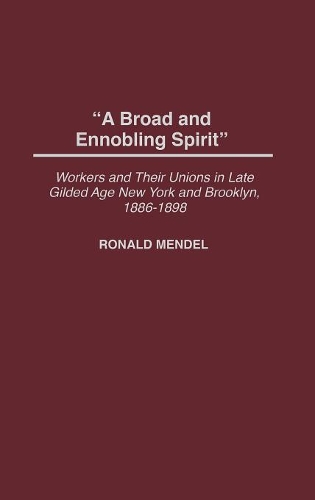
A Broad and Ennobling Spirit: Workers and Their Unions in Late Gilded Age New York and Brooklyn, 1886-1898
(Hardback)
Publishing Details
A Broad and Ennobling Spirit: Workers and Their Unions in Late Gilded Age New York and Brooklyn, 1886-1898
By (Author) Ronald Mendel
Bloomsbury Publishing PLC
Praeger Publishers Inc
30th October 2003
United States
Classifications
Professional and Scholarly
Non Fiction
331.8809747109034
Physical Properties
Hardback
264
Description
With the introduction of new production methods and technological innovation, tradesmen and workers encountered new challenges. This study examines the development of trade unions as a manifestation of working class experience in late Gilded Age America. It underscores both the distinctive and the common features of trade unionism across four occupations: building tradesmen, cigar makers, garment workers, and printers. While reactions differed, the unions representing these workers displayed a convergence in their strategic orientation, programmatic emphasis and organizational modus operandi. As such, they were not disparate organizations, concerned only with sectional interests, but participants in an organizational-network in which cooperation and solidarity became benchmarks for the labor movement. Printers coped with the mechanization of typesetting by promoting greater cooperation among the different craft unions within the industry, with the aim of establishing effective job control. Building tradesmen exerted a pragmatic militancy, which combined strikes with overtures to the employers' business sense, to uphold the standards of craft labor. Cigar makers, especially handicraftsmen who found their position threatened by machinery and the growth of factory production, debated the merits of a craft-based union against the possible advantages of an industrial-oriented organization. Garment workers, caught in the snare of a sweating system of labor in which wages and work loads were inversely related, organized unions to mount strikes during the busy season in the hope of securing higher wages, only to see them whither in the midst of slack periods.
Reviews
[W]ell written and the argument convincing.Recommended. Graduate, faculty, and professional collections. * Choice *
[R]onald Mendel offers a highly detailed study of worker experiences and union organization in four trades (cigar making, printing, building, and garment making) in New York and Brooklyn in the late Gilded Age.[t]here is much to learn in his account of the complexity and flexibility of craft workers' responses to their evolving economic circumstances in two major cities at the end of the nineteenth century. * The Journal of American History *
Author Bio
RONALD MENDEL is Senior Lecturer in American Studies at University College, Northampton. He has held previous positions at Rutgers University and the City University of New York.
